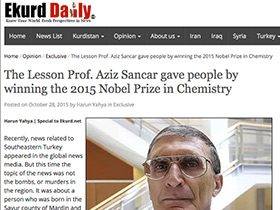
Recently, news related to Southeastern Turkey appeared in the global news media. But this time the topic of the news was not the bombs, or murders in the region. It was about a person who was born in the Savur county of Mardin and worked for two years in the same area as a medical doctor after completing his education.
It was Prof. Aziz Sancar. He has been the topic of much news coverage for winning the 2015 Nobel Prize in Chemistry. Prof. Sancar is a faculty member of the Biochemistry and Biophysics Department at North Carolina University.
His award-winning work is about the repair of DNA, which most of us are not aware of, but it is something that goes on within our bodies at every moment. Sancar states the followings with regard to his award-winning work:
"DNA repair is essential in protecting humans against cancer because many of the factors causing cancer, damage the DNA, resulting in cancer. We have shed light on 'how DNA repairs itself and how cells defend themselves against cancer.' Furthermore, DNA repair is also essential for cancer treatment because many of the drugs used to treat cancer damage the DNA of cancer cells and the cancer cells try to fix it. So we attempt to increase the effectiveness of the cancer drugs." (1)
Sancar could be considered a typical representative of the Southeasterners in the way that he also belongs to a large family with ten siblings. He is the child of an illiterate though intelligent mother and a hard-working father. In speaking about the award, his humility and warmth immediately shine. Despite having lived in the United States for many years, he has not broken his ties with his home country and his hometown. Sancar told BBC, "I am glad to be known for the work that I've done for years. Furthermore, I am also happy for my family, my homeland and my new homeland that I have come to. This is particularly important for Turkey." (2)
However when the news was first heard, something interesting happened; speculations about Sancar's ethnic origin became a topic of discussion instead of the fact that he won the Nobel Prize. Even the BBC was seemingly more interested in Sancar's ethnic origin rather than his work.
Prof. Aziz Sancar expressed his displeasure with the questions of some media organizations and some of the comments about his origin floating around in social media.
He explained, "... BBC called me and disrespected me by asking whether I was an Arab or partly Turkish. I said, 'I don't speak Arabic, I don't speak Kurdish. I am Turkish'. If you are a southeasterner, you can't escape from it but I know myself, I also told BBC and I'm telling you too" says Sancar.
Sancar noted "... BBC's first question was that “Are you Arab?,” I am Turk, that's all. Well, it doesn't matter if I was born in Mardin, Cizre, or Kars. I am a Turkish person," he said. (3)
Prof. Sancar's last sentence makes it clear that political discussions regarding the ‘so-called’ Turkish – Kurdish separation, did not find any support in the Turkish society. Prof. Sancar's brother, Tahir Salamat's wife, Gulsen Sancar, also weighed in and said, "Aziz's prize is an honour for all of us; the Turkish Kurds. What is it that we cannot share? Her words (4) reflect the outcry over this beautiful news being turned into a political problem and for questions like "a Turk won the Nobel Prize? No, actually he is a Kurd."
For years many citizens of the Republic of Turkey with Arab, Greek, or Bosnian origins have lived in various parts of Anatolia. All of these people together form the "Turkish nation". All children in Turkey, whether they are Arabs, Kurdish, Laz, or Turkish, study in the same classrooms and live in whatever city they wish. Everyone is considered a first-class citizen and has equal rights just like in the United States, where many ethnic groups from around the world consider themselves Americans. In Turkey everyone is considered as a Turk as the meaning of being a citizen of this country.
Once again, Sancar's statements showed the whole world that there was no problem of ethnic discrimination in Turkey that is open to exploitation. Prof. Sancar's life story is an inspiring example for people not only in Turkey but indeed, all over the world.
References:
(1) http://www.milliyet.com.tr/nobel-odulunu-kazanan-sancar-in-gundem-2128721/
(2) http://www.bbc.com/turkce/haberler/2015/10/151007_nobel_kimya
(3) http://aa.com.tr/tr/turkiye/nobel-odullu-sancar-duygularini-aa-ile-paylasti/436248
(4) http://www.trthaber.com/haber/turkiye/nobel-odullu-sancari-ailesi-anlatti-207941.html
Adnan Oktar's piece on EKurd Daily:


